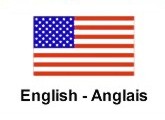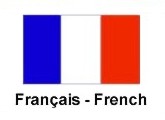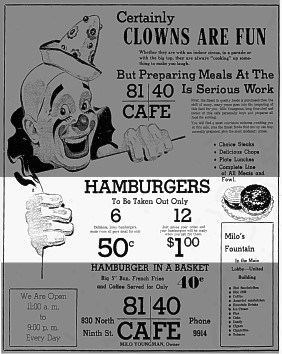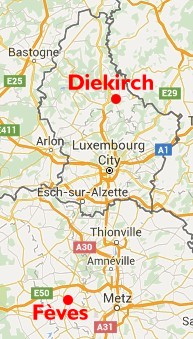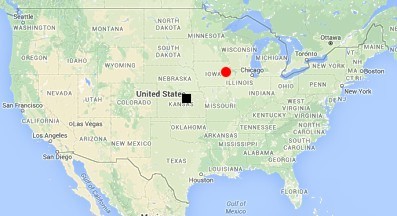The seventy dollars for the Children's Crusade Carson
mentioned in her letter to Todd doesn't sound like much today, but it went a little further then. At the left is an
advertisement from 1951 for a café in nearby Salina, Kansas. At 12 hamburgers for a dollar, that $70 would buy 100
children a hamburger every day for more than a week.
We do not know how many villages Todd made available or what information was provided. But we do know that on July 15,
a number of Morganville's citizens met again on Carson's porch.
Carson told McKee, "... the dossiers arrived from which we were to choose. The committee invited people to come
to my front porch; boys from the pool room, men from the chamber of commerce, and the church. It was exciting,
this vicarious traveling."
Advertisement in a 1951 Salina, Kansas newspaper
So how did Todd's Operation Democracy select villages for adoption? The answer is not known with certainty, but it appears that American Aid to France's sister organization Entr' Aide Francaise, located in Paris, sent out evaluation teams of two people. They assessed if the damage was such that help was warranted. If it was, they determined if there were local people who could manage the distribution of any aid that might arrive.
These evaluations appear to have been conducted
quietly, for the people in villages chosen seemed surprised. It was not unusual for people from neighboring villages
to come asking, in effect, "Why you and not us?"
The need for these assessments was driven by the fact that conditions varied greatly. Locations that had been the site
of fortifications or military industries were often badly damaged. But farm villages or residential areas were often
little damaged and more likely to suffer only shortages of fuel, electricity and commodities that depended on
transportation.
Fèves' proximity to the ridge and forts meant it had been heavily damaged. But the situation in Diekirch,
Luxembourg, 60 miles to the north, was quite different. This contrast can be seen in the following letter Todd wrote
on December 3, 1948:
Location of Diekirch compared to Fèves
LUXEMBOURG - Sitting with Burgomaster Greisch in his lovely home, I read over the letter he had just received
from Mt. Vernon, Iowa. ... The good Mrs. Smith of Mt. Vernon sent a tape-measure ... so that the ladies of Diekirch
could be measured for dresses. My hosts were deeply touched, but they were also amused beyond words. You see,
Luxembourg has nearly everything. I am sure that, despite their horrible scars, the people ... live better than most
people in Mt. Vernon. There is wonderful food; the stores are crammed with merchandise. The bridges are new, and
there is gay modernity about Luxembourg, as though it had just been hatched.
BUT the library at the ... college has only the oldest English texts. The Nazis left them some good German books on
America, with elaborate prefaces about our decadence. These are reserved, I might add, only for scholars and
historians, and turn even their stomachs. There wasn't an American magazine.
Above all, however, I found the greatest interest in this thing called "affiliation" with Mt. Vernon. The
Burgomaster himself is preparing two scrapbooks to send. He hopes deeply that gifts can be exchanged; that a boy can
someday go to the college in Mt. Vernon; that the Mayor of Mt. Vernon will come to visit him.
If Mt. Vernon sends clothes, he will receive them gladly and give them to needy cases (there is always need - in the Old Ladies' Home, the Orphanages, etc.) but he will someday explain to Mt. Vernon how things are going here and suggest that it might be better for Mt. Vernon to send some little symbolic gift like a set of good books on American history, a painting by an American artist, etc.
